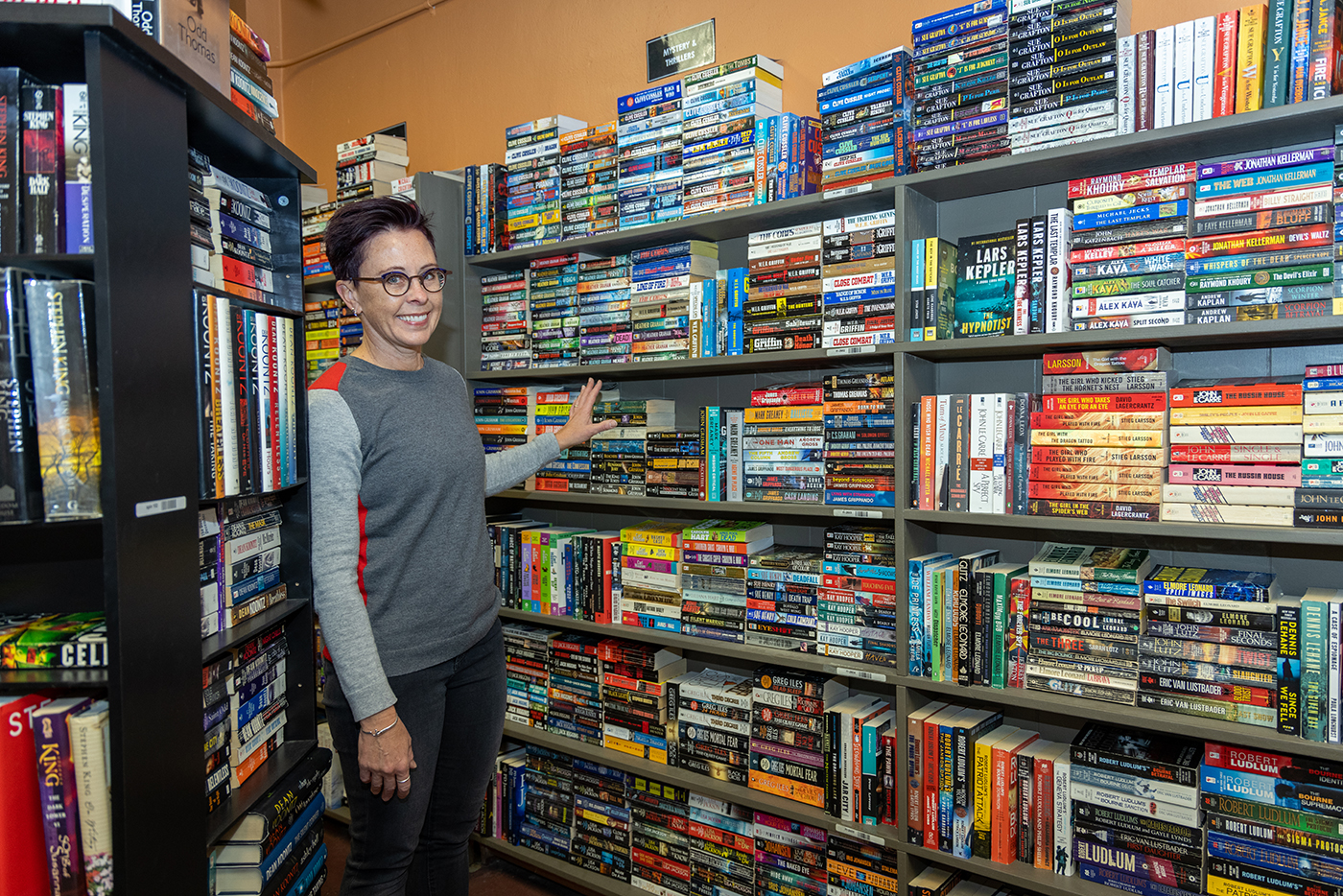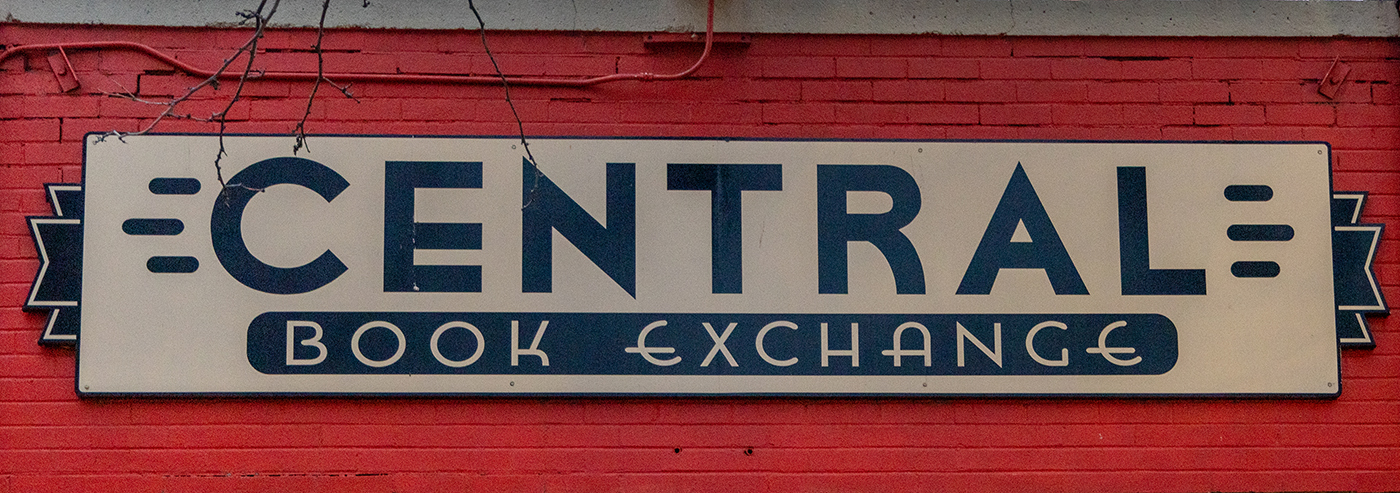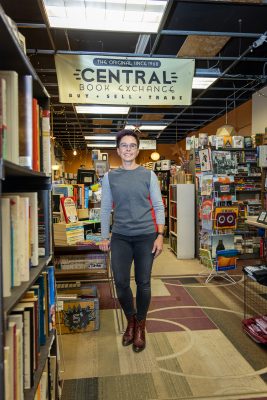
A Little of a Lot at Central Book Exchange
Book
Central Book Exchange
2017 1100 E.
Mon–Fri: 10 a.m.–7 p.m. | Sat: 10 a.m.–5 p.m. | Sun: 10 a.m.–4 p.m.
801.485.3913 | central-bookexchange.com
When Pam Pedersen—Owner of Central Book Exchange—was a kid, she would often draw the floor plans of imaginary houses for her future self to live in. While most of the rooms in these early scale drawings were conspicuously small, the library was always drawn, in Pedersen’s words, “as large as a football field.” In her adult life, between the shelves of her bookstore and a warehouse space for overflow, Pedersen oversees an ever-changing inventory of over 75,000 books. When asked if her childhood drawings predestined her vocation as a bookseller, Pedersen simply says: “Books have always been in my head and in my heart.”
Located in Sugar House, Central Book Exchange has been selling and exchanging used books since 1968. When Pedersen bought the business in 2005, she had been looking for a way into the book business that would simultaneously benefit the community, and Central Book Exchange was the ideal opportunity. Since then, she has made the store her own, curating the massive collection and creating a faithful following of returning customers.
A unique trade-in-for-points process is the decades-old foundation of Central Book Exchange. Though customer’s points are now tracked digitally instead of via notecard, the system remains as simple as ever: Bring your books into the store, and they will be quickly assessed and sorted by condition and size. Pedersen notes that Central Book Exchange does not want people to feel concerned by the prospect of books being rejected by the store. She knows this feeling often deters people from trading in their used and cherished belongings, she is markedly clear on the subject: “No book shaming!,” she says. If the book is readable and ready to be loved by the next person, it is very likely that Central Book Exchange will accept the book in exchange for points. Every book on the shelves is labeled with a regular price and a “points price”—a discounted rate that offers customers a deal in exchange for contributing books, and value, to the store. For example, a used paperback novel priced at $8 will be a few dollars cheaper for those with points.

“Books have always been in my head and in my heart.”
While there is a big-box bookstore right down the street from Central Book Exchange, Pedersen is not intimidated by its presence. “The difference,” she says, “is that those big chains have a lot of a little, and we have a little of a lot.” While her store is unlikely to shelve a dozen fresh copies of a flashy new bestseller, Pedersen has plenty of space for “one copy each of cool little books that you’re unlikely to find anywhere else.” Recently, while digging through the offbeat margins of her inventory, Pedersen discovered a guidebook performing tricks with a calculator published in 1981. “We all stared at it like: Where did this come from?,” she says. This is the sort of gem that sets Central Book Exchange apart from goliath book retailers. “We fill a totally different niche.”
While the store’s collection is massive and constantly in flux, Pedersen manages to keep the entire stock catalogued. This database can be accessed both in-store and on the Central Book Exchange website, where customers can browse and purchase books to be shipped or picked up in the store. The website has been a handy outlet for Pedersen during the pandemic, though she’s glad that the store is open once again and operating under regular hours. “Luckily, there is plenty of room for people to spread out inside. We are open and safe,” she says.
For Pedersen, the community building and heart-to-heart interactions that take place within the store are the all-important essence of Central Book Exchange. “The feeling in the store is that it is safe,” she says. “Often, people begin telling me about a book, and then I realize they’re also telling me about a cherished memory or a loved one who has recently passed away.” Pedersen knows that this kind of vulnerability is a community service uniquely provided by small bookstores—that’s why she is in the business. “The things in people’s hearts making them happy or sad come out in meaningful ways,” she says. “Humans share stories. That’s what we do. In the bookstore, you can share yourself and you’ll be honored and respected.”

“The difference is that those big chains have a lot of a little, and we have a little of a lot.”
As the time that people are dedicating to reading books seems to wane, bookstores will require consistent and intentional support from their communities. “The people who are regularly coming in, bringing good books, offering recommendations to others and creating a comfortable space are critical to our humanity and society,” Pedersen says. Though purchasing books helps the store to thrive, there are other forms of nurturing that are welcome, too. “The person who comes in to have an hour-long conversation is just as important to me as the person who buys a big stack,” Pedersen says. “You’re always going to feel better leaving the bookstore than when you came in. It’s just a good place.”
Central Book Exchange is open 10 a.m.–7 p.m. on weekdays, 10 a.m.–5 p.m. on Saturday and 12 p.m.–4 p.m. on Sunday. If you plan to trade in lots of books at once—i.e. several boxes or more—please contact the store ahead of time. Information regarding events and programs such as book clubs, poetry readings and warehouse sales is available online at central-bookexchange.com and in the store.